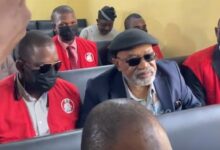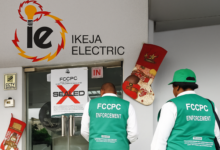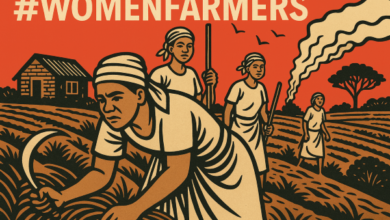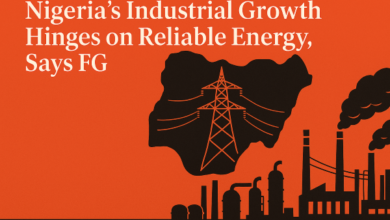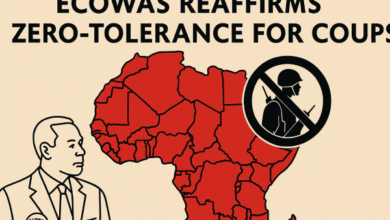Curbing the tide of open defecation in Nigeria; the Kwara example
 Bisola Ibrahim was at the Ero Omo Motor Park in Ilorin on a morning to board a bus to Benin City. Suddenly she became pressed; she needed a place to empty her bowel.
Bisola Ibrahim was at the Ero Omo Motor Park in Ilorin on a morning to board a bus to Benin City. Suddenly she became pressed; she needed a place to empty her bowel.
“I never had the feeling before I left home. I am not the type that poo every day; and because I did yesterday, I never envisaged the situation. So it really caught me unprepared,” said Ibrahim.
Since she could not cheat the nature, the passenger enquired for where she could ease herself; and she was referred to an integrated public toilet that Kwara Government recently built in the park.
This, Mr Samuel Dajo, an official of the park in-charge of the public toilet, said was a change from the past experience when travellers would have to hide somewhere whether in uncompleted buildings or nearby bushes to discharge faeces, if pressed.
This practice was similar among residents in many parts of the state particularly in the unstructured areas, where people excreted openly at dumpsites, fields and in the canals among others.
Consequent to these repulsive habits, the Water, Sanitation and Hygiene National Outcome Routine Mapping (WASH NORM) Report in 2019 rated Kwara the highest among states with the prevalent cases of open defecation in Nigeria.

The WASH NORM report is a summary of annual survey usually carried out by the National Bureau of Statistics under the leadership of the Federal Ministry of Water Resources, with technical and financial support from the UNICEF, World Bank and African Development Bank.
According to this 2019 document, 64 per cent of residents in Kwara engaged in the practice of open defecation, followed by Plateau, 61; while Ebonyi and Kogi trailed, but tied at 58 per cent prevalence.
The findings noted, as well, that only 14 per cent of people in Kwara, Oyo and Ebonyi had access to basic sanitation services. All in all, the report showed that 44 million people openly defecated in Nigeria for the year, a figure that now soared to 48 million in the 2021 report, released recently.
Nigeria displaced India in the year to emerge the first on the rung of countries with the highest prevalent cases globally.
Open defecation has devastating consequences for public health. According to the UNICEF, faecal contamination of the environment and poor hygiene practices remain a leading cause of child mortality, morbidity, under-nutrition and stunting across the world. These, the international agency maintains, potentially have negative effects on cognitive development of children.
The UNICEF also claims that poor sanitation can be a barrier to education and economic opportunity, with women and girls often particularly vulnerable to the consequences of poor sanitation services.
To stem the tide of this unhygienic behaviour among the residents, the present administration in Kwara declared a State of Emergency on WASH in 2019. With the declaration, the government began to erect integrated public toilets in strategic places across the state in 2019. The facilities consist of 10-room, for excreta, which are partitioned for men and women; as well as sections for urination and bathing.

One of such facilities is located at the Ero Omo Motor Park, on the popular Ajase-Ipo road, Ilorin. Malam Shehu Onikijipa is a transporter at the park and uses the facility whenever he is desirous of passing excrement. Onikijipa explained that the convenience is suitably serving the people, known for openly defecating around in the past.
“I use it and it is well maintained. Anytime one of us (transport workers) is pressed, we rush there to ease ourselves. But more importantly, travellers who come here to board buses to various destinations use it often.
“Though we are charged N50 for excrement and N20 to urinate, it is these monies that are used for the daily upkeep of the facility. There are two women engaged for the cleansing of the place. The duo works on shift.
“There is a section for bathing too; that costs N50 as well. These charges are affordable, when viewed in relation to the need for the structure to be well kept at all time. So we pay without any problem,” he said.
Onikijipa also recounted that the solar powered boreholes at the toilet helped to resolve the problem of water supply at the park. One of the boreholes, he said served the toilet while the other supplies water to the people in the neighbourhood.
He, nonetheless, advocated expansion of the toilet, sequel to the rising number of travellers, and people coming to the restroom from outside. Moreover, the transport worker pleaded for ground-tiling of the park, as he noted that the place becomes deplorable during rainy season.
At Isale Aluko, the location of one of the public toilets at the hinterland, where residents use dumpsites and uncompleted buildings for excretion in the past, obviously the narrative was changed; with the facility now being the only place the people relieve themselves.
Kayode Jaji, a frequent user of the toilet said “the toilet is very useful. For instance, I do not live here; I only come every day to relate with friends. So anytime I am pressed, I use the restroom because it’s difficult for me to go home.
“Many shop owners and traders here do not have toilets as well; so they make use of the facility. In the past, we used uncompleted buildings around and dumpsite whenever we were pressed.”

Jaji also attested that the solar powered borehole integrated in the project is helping to address the water need of the households in the area. As against the practice in other facilities however, he noted that users of the Isale Aluko toilet do not pay to use the convenience room.
“We do not pay to use the toilet; nobody pays. For example, I am a graduate with no job. So we use it for free. Besides, the person taking care of the toilet is a brother. So we relate based on that,” said Jaji.
The situation is similar at Sabojo area of Ilorin, where travellers at Sawmill Motor Park, traders, passersby and students of Kwara State College of Education, Ilorin visit another public toilet, situated at the area, anytime they are pressed to answer the call of nature. Hitherto, people in the axis went to the bank of Okun River to defecate.

“Many users of this toilet are travellers, who are pressed, and need a place to ease themselves urgently. So, commercial motorcycles bring them here in number to use the restroom,” said Alhaji Issa Agaka, a motor dealer, who oversees the maintenance of the toilet.
In addition to this, Mrs Toyosi Adebayo-Thomas, Senior Special Assistant on Inter-Governmental Affairs to Gov. AbdulRahman AbdulRazaq of Kwara, who coordinates Open Defecation Free (ODF) programme in the state, said the government also incorporated construction of toilets into the renovation of public primary and secondary schools.
This according to Adebayo-Thomas correspondingly goes on with engagements, leading various communities across the state to build toilets and aware of the negative effect of open defecation. The state also carried out repair of waterworks and building of boreholes to provide water for the citizens.

The state ODF coordinator further claimed that 1,600 youth volunteers are engaged by the state, for Hand-Washing and Clean Nigeria Campaign, with the prompt payment of counterpart fund for Partnership for Expanded Water Supply, Sanitation, and Hygiene (PEWASH). All these, she said were targeted at ensuring open defecation free Kwara by 2025.
Three years into these efforts, the WASH NORM Report for 2021 shows Kwara has dropped on the ladder of open defecation by states to fifth, behind Ebonyi, Plateau, Kogi and Oyo. Access to basic sanitation service in the state also improves from 14 per cent to 31. This latest report was released in June.

Even though the number of people practising open defecation in Nigeria shot up to 48 million in the new study, the prevalent rate in Kwara stepped down to 50 per cent from the 64 recorded in 2019.
Yet, It’s not Perfect
Because users of the facility at Isale Aluko refuse to pay for the utility, Jimoh Mustapha, who takes up its upkeep, is accordingly constrained by the burden of cost of maintenance, which exclusively, falls on his shoulder.
“Nobody is paying. Though, government instructed we charge a token for the services, users seldom pay because we are all brothers in this community. So I do the work voluntarily, and even use my money to buy soaps and disinfectants to wash the facility,” Mustapha said.
Besides, he noted, as well, that the soakaway dug for the toilet was small; hence, it easily filled up, brewing offensive odour into the atmosphere.
“One of the challenges is that the soakaway is too small, and fills up easily. As a result, it emits odour disgustingly, making the residents of the area uncomfortable.
“We have been constrained on many occasions to discharge the soakaway into a water channel whenever it rains. Government should come to our aid by either digging a bigger soakaway or lay pipes into a water channel for proper discharges,” he said.
The size of the soakaway in all the facilities was the same, until the managers of the Ero Omo and Sabojo toilets; Mr Dajo and Alhaji Agaka respectively dug larger cesspits from the charges, to continue to serve.
Beyond this, Agaka also bemoaned incessant burglary attacks on the solar installations at the Sabojo facility.
To address this problems, an official of the Rural Water Supply and Sanitation Agency (RUWASA) in Near a, Mr Rufai Olalekan, said measures a being put in place to check them.
“The OFF team will swing into action and assess the situation with a view to getting the Governor approval for rectifying the challenges. This is a laudable programmes that is beneficial to our people and everything will be done to sustain it,” he said.
(NAN)



